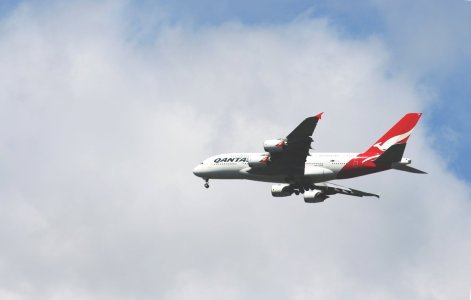Exposing the ‘slot hoarding’ tactic: How major airlines like Qantas and Virgin are affecting your travel plans
In recent months, the Australian Competition & Consumer Commission (ACCC) has levelled serious allegations against Qantas, accusing the airline of intentionally cancelling 15,000 flights for its financial benefit.
The alleged cancellations, which occurred between May and June 2022, were said to be 'for reasons that were within its control'.
This isn't the first time airlines have been accused of such practices, known in the industry as 'slot hoarding'. But what exactly is slot hoarding, and how does it impact the traveller?
Slot hoarding is a tactic employed by major airlines where they intentionally book and then cancel flights to stifle competition at airports.
Days before the ACCC made its accusation, Robert Wood, Executive General Manager Aviation at Sydney Airport Corporation, informed the Standing Committee on Economics that he was convinced that major airlines were intentionally cancelling flights.
Moreover, outgoing Sydney Airport CEO Geoff Culbert stated in July that major airlines should be required to give up their airport time slots due to intentionally decreased flights through major domestic routes.
Earlier this month, he urged the federal government to take stronger action against airlines that misuse slots.
But what is an airport slot, and why is it so valuable?
An airport slot is a specific time allocated to an airline to land or take off at a particular airport.
Introduced in the 1970s by the International Air Traffic Association (IATA), the slot system was designed to manage airline traffic at the world's busiest airports, known as Level 3 airports.
These include high-demand airports like New York's John F. Kennedy (JFK) International Airport, London's Heathrow Airport, and Sydney's Kingsford Smith Airport.
The demand for slots at these airports can be incredibly high, especially during peak times. In fact, around half of all airline passengers depart from a Level 3 airport.
The value of these slots is astronomical, with Oman Airways reportedly purchasing Kenya Airlines' Heathrow slot for US $75 million ($117 million in AUD) in 2016 and Air New Zealand's Heathrow slot selling for NZ $42 million ($38.77 million in AUD) in 2020.
According to Brett Snyder, creator of the airline website Cranky Flier, airport slots have a high influence on the airline’s ability to generate demand.
The slot system includes a clause known as 'grandfather rights', which allows airlines to retain their number of slots for the following six months if they've operated at 80 per cent of their schedule.
While this clause is intended to maintain stability, it can unintentionally favour older airlines, according to Amedeo Odoni, an emeritus professor at the Massachusetts Institute of Technology (MIT).
‘In a very competitive environment, this becomes an anti-competitive device,’ he said.
The combination of slot value and distribution has resulted in airlines hoarding slots, strategically blocking other airlines from gaining access to unallocated slots.
This can be achieved by airlines intentionally scheduling more flights than their capacity and subsequently cancelling the excess flights, which eliminates competition from high-traffic airports.
Ian Douglas, a Senior Lecturer in aviation at the University of New South Wales (UNSW), stated that IATA's ‘grandfather rights’ system doesn’t prevent slot hoarding.
‘The idea of slot hoarding is that you put out a schedule that you really know you're never going to fly, and you might not even have all the resources to fly, but you publish it, and you maintain these historical slots that you've had maybe for 10, 15 years,’ he explained.
‘And then you selectively cancel certain flights during the season, being very careful not to ever cancel more than 20 per cent of them,’ Dr Douglas added.
The ACCC's August allegation claimed that between May and July 2022, more than 15,000 Qantas and QantasLink flights were cancelled, representing around 22 per cent of their scheduled flights.
Qantas has previously stated that bad weather and air traffic control staffing shortages were the main reasons for flight cancellations. The company insisted they did nothing illegal, and filed a legal defence denying that laws were broken.
Addressing the issue of slot hoarding is complex. Some suggested a bid-based system where airlines have to pay for slots. However, this could lead to higher fares for passengers.
A 2021 review of Sydney Airport urged the federal government to increase the scrutiny of ‘cancellations data for selected domestic slots’.
Additionally, a submission from Sydney Airport recommended updating operating regulations, including increasing runway movements to manage demand beyond the current slot system limit of 80 per hour.
These measures have yet to be adopted, but the government is currently considering the recommendations, and announcements around slot misuse are expected to be introduced 'in due course'.
Here’s a more detailed explanation about airport slots:
The issue of slot hoarding is a complex one with significant implications for both airlines and travellers. As consumers, it's important to stay informed about these practices and their potential impacts on your travel plans.

What are your thoughts on this issue, members? Have you been affected by flight cancellations? Share your experiences and opinions in the comments below.
The alleged cancellations, which occurred between May and June 2022, were said to be 'for reasons that were within its control'.
This isn't the first time airlines have been accused of such practices, known in the industry as 'slot hoarding'. But what exactly is slot hoarding, and how does it impact the traveller?
Slot hoarding is a tactic employed by major airlines where they intentionally book and then cancel flights to stifle competition at airports.
Days before the ACCC made its accusation, Robert Wood, Executive General Manager Aviation at Sydney Airport Corporation, informed the Standing Committee on Economics that he was convinced that major airlines were intentionally cancelling flights.
Moreover, outgoing Sydney Airport CEO Geoff Culbert stated in July that major airlines should be required to give up their airport time slots due to intentionally decreased flights through major domestic routes.
Earlier this month, he urged the federal government to take stronger action against airlines that misuse slots.
But what is an airport slot, and why is it so valuable?
An airport slot is a specific time allocated to an airline to land or take off at a particular airport.
Introduced in the 1970s by the International Air Traffic Association (IATA), the slot system was designed to manage airline traffic at the world's busiest airports, known as Level 3 airports.
These include high-demand airports like New York's John F. Kennedy (JFK) International Airport, London's Heathrow Airport, and Sydney's Kingsford Smith Airport.
The demand for slots at these airports can be incredibly high, especially during peak times. In fact, around half of all airline passengers depart from a Level 3 airport.
The value of these slots is astronomical, with Oman Airways reportedly purchasing Kenya Airlines' Heathrow slot for US $75 million ($117 million in AUD) in 2016 and Air New Zealand's Heathrow slot selling for NZ $42 million ($38.77 million in AUD) in 2020.
According to Brett Snyder, creator of the airline website Cranky Flier, airport slots have a high influence on the airline’s ability to generate demand.
The slot system includes a clause known as 'grandfather rights', which allows airlines to retain their number of slots for the following six months if they've operated at 80 per cent of their schedule.
While this clause is intended to maintain stability, it can unintentionally favour older airlines, according to Amedeo Odoni, an emeritus professor at the Massachusetts Institute of Technology (MIT).
‘In a very competitive environment, this becomes an anti-competitive device,’ he said.
The combination of slot value and distribution has resulted in airlines hoarding slots, strategically blocking other airlines from gaining access to unallocated slots.
This can be achieved by airlines intentionally scheduling more flights than their capacity and subsequently cancelling the excess flights, which eliminates competition from high-traffic airports.
Ian Douglas, a Senior Lecturer in aviation at the University of New South Wales (UNSW), stated that IATA's ‘grandfather rights’ system doesn’t prevent slot hoarding.
‘The idea of slot hoarding is that you put out a schedule that you really know you're never going to fly, and you might not even have all the resources to fly, but you publish it, and you maintain these historical slots that you've had maybe for 10, 15 years,’ he explained.
‘And then you selectively cancel certain flights during the season, being very careful not to ever cancel more than 20 per cent of them,’ Dr Douglas added.
The ACCC's August allegation claimed that between May and July 2022, more than 15,000 Qantas and QantasLink flights were cancelled, representing around 22 per cent of their scheduled flights.
Qantas has previously stated that bad weather and air traffic control staffing shortages were the main reasons for flight cancellations. The company insisted they did nothing illegal, and filed a legal defence denying that laws were broken.
Addressing the issue of slot hoarding is complex. Some suggested a bid-based system where airlines have to pay for slots. However, this could lead to higher fares for passengers.
A 2021 review of Sydney Airport urged the federal government to increase the scrutiny of ‘cancellations data for selected domestic slots’.
Additionally, a submission from Sydney Airport recommended updating operating regulations, including increasing runway movements to manage demand beyond the current slot system limit of 80 per hour.
These measures have yet to be adopted, but the government is currently considering the recommendations, and announcements around slot misuse are expected to be introduced 'in due course'.
Here’s a more detailed explanation about airport slots:
The issue of slot hoarding is a complex one with significant implications for both airlines and travellers. As consumers, it's important to stay informed about these practices and their potential impacts on your travel plans.
Key Takeaways
- The Australian Competition & Consumer Commission (ACCC) has accused Qantas of cancelling 15,000 flights between May and June 2022 for its financial gain.
- This cancellation of flights to prevent competition at airports is referred to as 'slot hoarding,' a tactic also possibly used by other major airlines.
- An airport slot is an allocated time that an airline can land or take off at a specific airport, a system that can be manipulated to disadvantage smaller airlines.
- The issue of slot hoarding is complex, with possible solutions including a bid-based system for airport slots or increased scrutiny of cancellations data.
What are your thoughts on this issue, members? Have you been affected by flight cancellations? Share your experiences and opinions in the comments below.








